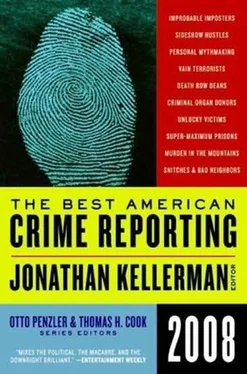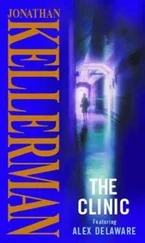Bethea’s argument has a certain elegance. But the distinction he draws between the drug dealer who flips and the civilian who is just trying to get dealers off her stoop has ceased to mean much. Just ask the Dawsons. Or Edna McAbier, a community activist who tried to clean up drugs in her North Baltimore neighborhood. The local chapter of the Bloods considered blowing her head off with a shotgun but settled for firebombing her house, in January 2005-not long after Stop Fucking Snitching made news. McAbier escaped with her life, and her house was not badly damaged; those responsible received long prison sentences. But though the gang members didn’t succeed in killing her, they did silence her: She left Baltimore out of fear for her safety. And the city got the message: If you break the code, you are in danger-even if you are a “civilian.”
BY THE TIME OF THE MCABIER FIREBOMBING, John Dowery was starting to reap the rewards of his decision to testify in the state’s prosecution of Tracy Love and Tamall Parker. His own trial had been postponed indefinitely. He had been released from home confinement, his drug-treatment program was going well, and he had started working.
So far, Baier had kept Dowery’s name out of the investigative records, referring to him simply as “a Federal Suspect” and “the Source” so the state would not have to disclose him as a witness until closer to the trial date. He had also deferred taking a taped statement from Dowery, out of concern for his safety. These were sound precautions: On several occasions, prosecutors have intercepted “kites”-letters from a defendant, smuggled out of jail-detailing the prosecution’s witness list and instructing friends or relatives to “talk” to those on it. But Baier could not keep Dowery’s name a secret forever. Sooner or later, the government would have to tell defense lawyers that he was going to testify. In the meantime, suspicions about Dowery had already begun to circulate in the neighborhood. “Somebody approached me saying, ‘Yeah, you snitching on us,’” he told Baier.
The case against Love and Parker languished. A trial was set for early April 2005 and then postponed until May, and then postponed again, and then again-seven times in all. In Baltimore, as in most major U.S. cities, the large number of cases and the shortage of judges, courtrooms, and lawyers make such delays common. Some cases have been postponed more than 30 times and have dragged on for more than five years. And each postponement increases the risk that witnesses who were cooperative will cease to be so-that they will move and leave no forwarding address, change their stories, genuinely forget facts, or turn up dead. “The defense attorneys play this game,” says Brian Matulonis, the lieutenant in charge of Baltimore’s Homicide Operations Squad. “If the witness is not there, they are ready to go. If the witness is there, they ask for a postponement.”
On May 20, 2005, Baier finally took a taped statement from Dowery. It was delivered to defense lawyers in June. Soon afterward, Dowery got a phone call from Love.
“That’s fucked, man. Why you gonna do me like that?” the defendant seethed.
“I said I didn’t know what he was talking about,” Dowery would tell the jurors during the trial. “I was testifying the whole time. But I just act like I didn’t know what he was talking about.”
A few weeks later, Love called Dowery again. “He like, ‘Man, the other guy, he say he ain’t gonna testify. What about you?’”
Dowery again played dumb. “I say, ‘Man, he lied. I don’t know whatcha talking about. You cool.” Love seemed satisfied. “It was, like, a friendlier conversation the second time,” Dowery would testify.
Dowery was nervous about the calls and about becoming known in the neighborhood as a snitch. But he didn’t believe he was in immediate danger. The trial kept getting pushed back. Summer gave way to fall. Then came the morning when two men met him at his front door with a gun.
ONE OF JESSAMY’S primary weapons against witness intimidation is her office’s witness-assistance program. Unlike the federal witness-protection program-the one most people know about from the movies-Baltimore’s program can’t provide marshals to guard witnesses around the clock for years. It can’t offer witnesses a new identity in some distant city. Instead, the Baltimore program-run by a staff of two, with an annual budget of $500,000-tries to get witnesses out of harm’s way by putting them in low-budget hotels that serve as temporary safe houses. The average stay is 90 days. The program also helps witnesses relocate permanently, generally within Maryland, providing a security deposit or first month’s rent, moving costs, and vouchers for food and transportation. If necessary, it helps with job placement and drug treatment.
In most cases, this is enough to keep witnesses safe. Few Baltimore drug gangs have much reach beyond a couple of blocks, let alone outside the city. Still, many witnesses refuse the help. Almost a third of the 255 witnesses whom prosecutors referred to the program last year did not even come to an initial meeting. Of the 176 who did, only 36 entered safe housing. “Many of these people have never left their neighborhood,” says Heather Courtney, a witness-assistance coordinator. “A lot of people can’t handle it. They just can’t be out of that neighborhood. That is all they know.”
Even after the shooting, Dowery did not want to leave East Baltimore. He had spent his whole life there. His entire family-aunts, uncles, cousins-lived nearby, most on or near Bartlett. This included many of his nine children. In a neighborhood of absentee fathers, Dowery doted on his kids. Two of them lived with him and Yolanda. And he tried to stay involved in the lives of the others.
Eventually the witness coordinators prevailed upon Yolanda, who in turn convinced Dowery that they should leave. After less than two weeks in a hotel, Dowery, Yolanda, and their five-year-old daughter moved to a house outside the city. Most of his relatives remained in the old neighborhood.
THE TRIAL OF Tracy Love and Tamall Parker for the murder of James Wise began on January 26, 2006, in the cramped courtroom of Baltimore Circuit Judge Sylvester Cox. During opening arguments, Christopher Nosher, the boyish assistant state’s attorney prosecuting the case, appeared confident. Although Judge Cox had barred any reference to the shooting attack on Dowery, ruling that the defendants had not been definitively linked to the incident, Dowery would be allowed to testify about the phone calls from Love. For Nosher, this was a coup: Jurors can be instructed to interpret a threat against a witness as “consciousness of guilt.” Evidence of intimidation can also help juries understand why witnesses may back up on the stand.
Nosher had another reason to be confident: He knew that all of his witnesses would show. John Craddock, the man who had caught three numbers of the Lexus’s license plate, had never wavered during the long pretrial process. Bassett, Jay’s accomplice, had been convicted of his drug charges and was serving a seven-year sentence, so he wasn’t going anywhere. And both Dowery and Doris Dickerson had remained cooperative.
In this respect, the trial was unusual. Witnesses so commonly miss court dates in Baltimore, whether from fear or irresponsibility, that Jessamy’s office has resorted to arresting them just to compel their appearance. Jessamy acknowledges that arresting witnesses is hardly ideal-it tends to make them hostile to the prosecution and more likely to back up, and it further sours police-community relations. “But if you’ve done everything you can to get them to come voluntarily, then you do what you have to do,” she says.
That afternoon, Dowery took the stand. He had always been skinny, but in the witness box he looked gaunt. His long, loose-fitting black shirt covered a colostomy bag, a result of the October 2005 shooting. Dowery spoke in a deep, soft voice as Nosher walked him through the events he witnessed on the day James Wise was murdered.
Читать дальше












